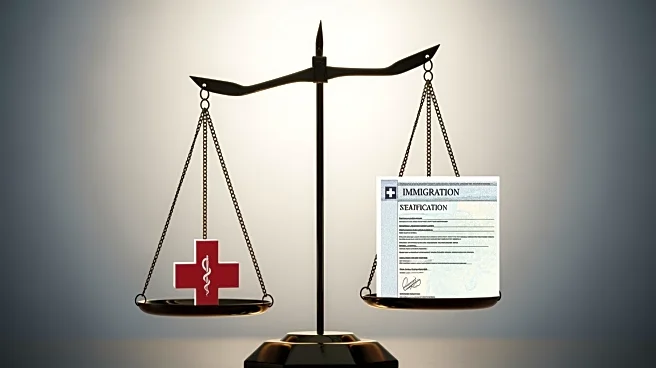What's Happening?
The Trump administration has instructed state Medicaid programs to verify the immigration status of certain enrollees, as part of a broader effort to ensure that federal benefits are not being improperly
allocated to undocumented immigrants. This directive has resulted in over 170,000 names being flagged for review across five states, including Colorado, Ohio, Pennsylvania, Texas, and Utah. The Centers for Medicare & Medicaid Services (CMS) claims that over $1 billion in federal funds have been spent on Medicaid for individuals without legal status. However, several states have disputed these figures, arguing that their Medicaid payments comply with both state and federal laws. The initiative has sparked criticism from state officials and advocacy groups, who argue that it places an unnecessary burden on state resources and could lead to eligible individuals losing coverage due to administrative errors.
Why It's Important?
This move by the Trump administration highlights the ongoing debate over immigration and the allocation of federal resources. By targeting Medicaid, a program that provides essential health coverage to low-income individuals, the administration's actions could have significant implications for millions of Americans who rely on these services. Critics argue that the policy could lead to eligible individuals losing coverage, exacerbating health disparities and placing additional strain on state resources. The directive also underscores the administration's broader immigration agenda, which has faced legal challenges and opposition from various states and advocacy groups. The outcome of this initiative could set a precedent for how federal benefits are administered and who is deemed eligible to receive them.
What's Next?
State Medicaid agencies are currently reviewing the lists provided by the CMS to verify the immigration status of flagged enrollees. This process may lead to further disputes between state and federal authorities over the accuracy of the data and the legality of the administration's actions. Additionally, the directive could face legal challenges from states and advocacy groups who argue that it violates federal law or places an undue burden on state resources. The outcome of these reviews and potential legal battles will likely influence future policy decisions regarding the administration of federal benefits and the treatment of undocumented immigrants in the U.S.











